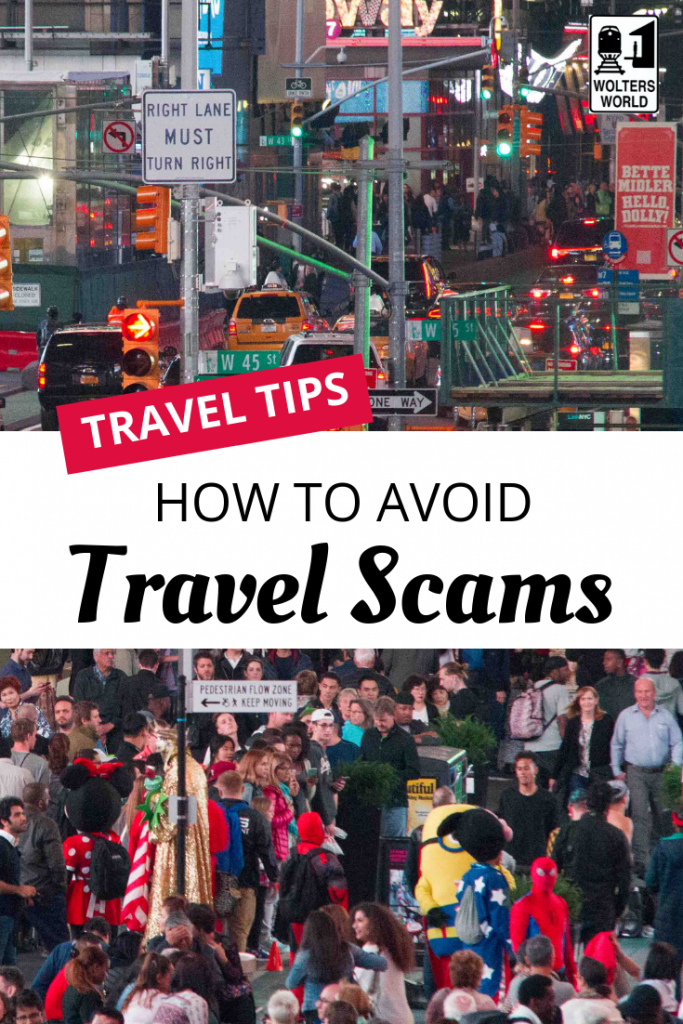Hey there, fellow travelers! Today, we’re in Vienna, Austria, one of my favorite cities. When you think about travel, you think about the beautiful sights you’re going to see, the delicious food you’re going to sample, and the experiences you will have. What you probably don’t think about are all the travel scams and rip-offs you might fall victim to as a tourist. What’s worse, in places like Spain and Italy where these scams are so common, the police are not usually willing to get involved. So, today we’re sharing some of those travel scams to help you be more aware and prepared to avoid these travel scams.
Bird Poop / Mustard Scam
I see this one a lot, and it’s even happened to my parents. Someone will walk by you and notice something on your shirt, or they may even “accidentally” squirt some mustard on you. They nicely offer to help clean you up, while their accomplice swoops in to pickpocket you or snatch your bag while your attention is diverted. Even if there is something on your shirt, politely refuse help and clean it off yourself.
Mother & Child Scam
There are a few versions of this one. It can be a large group of children that surround you and beg for money while one of them snatches your wallet or passport. You might also have a woman ask you to hold her baby for a minute, and when you hand back the baby, your wallet is missing. Don’t be fooled by innocent looking children; their parents have put them up to this, knowing that children are less likely to look suspicious.

The Bump
This pickpocket move is a bit more traditional; someone on the street or on public transportation will bump into you. A few blocks later, you realize your phone (or wallet or passport) is gone. You might think you would definitely feel this happening, but you can’t. These thieves are trained professionals, and super smooth when they are picking your pocket.
Watch: What to Do if You Lose Your Passport
Subway Pickpockets
Another common pickpocket trick is for someone to follow you closely through the turnstile. You think they are just trying to get a free ride on the Metro, but they are actually picking your pocket as you pass through, and there’s so much going on, you won’t even notice. Pay close attention when you are getting on or off public transportation; it’s a common spot to be pickpocketed because the doors close and you are on your way while your wallet remains behind.
Read: Six Most Popular Places for Pickpockets
Taxi Scams
Not all taxi drivers are bad, in fact, some are quite helpful, however, not all of them have your best interests at heart. Taxi scams are pretty common, where the taxi driver takes the extra long way to arrive at your destination. They know you probably don’t know where you’re going, and they can make a few extra bucks on the fare. Sometimes, they’ll also “forget” to turn on the meter and then try to overcharge you. Another scam is quickly unloading your bags and taking off before you have a chance to count your bags.
How to Avoid Falling for a Scam Taxi:
- Take a photo of the cab, license plate, and driver’s information
- Make sure they turn on the meter right away
- Know how much it should cost
- Have the hotel call the cab for you
- Keep your eyes on your luggage when loading and unloading
- Don’t pay until you have all of your luggage out of the trunk
- Get a receipt
Hotel Scams
Some hotel scams, such as fake hotels that take your booking and your money, are becoming less common as you can book through big websites like TripAdvisor or Booking.com and have prior reviews and verified properties. However, there are other hotel scams to look out for. One is a phone call reportedly from the front desk, asking for your credit card number. Do not give out your credit card number over the phone. Offer to come down to the front desk to settle the issue. A hotel rip-off is the hotel breakfast. If the breakfast at your hotel isn’t included, don’t pay for it; you can get a better deal elsewhere, as hotel breakfasts are always overpriced.
Wait Staff Scams
Every once in a while, I hear about someone getting scammed at a restaurant. Either by being charged too much for something they didn’t order or getting incorrect change back from the waiter. Sometimes, you might order something that doesn’t have a price. Make sure you ask the price before ordering, or they will likely upgrade you to the most expensive option.
WiFi Scams
This one is common at hotels, restaurants and other public places. What looks like a free WiFi signal is actually a trap to capture your private information. Make sure you ask your hotel what the WiFi name is, along with the password. Pay close attention when you are logging in to a WiFi network, as the fake ones will often be spelled very similarly to the real one. Holliday Inn versus Holiday Inn, for example.

Sympathy Scams
Sometimes when you are eating at a restaurant, someone will drop off a card telling you they are blind or deaf, or some other way to drum up sympathy from you. Often, it’s not even true, but it’s almost always a scam. Don’t even take the card from them, or they’ll expect you pay them.
Games
Be wary of any game that someone on the street asks you to play. Whether it’s a card game, a shell game or any other game. Even if you see other people winning, those people are probably planted to fool you. Don’t fall for it! These games are set up to take your money. Another form of this is the betting game. Someone will bet you something silly, like guessing where you got your shoes. The answer is “on your feet.” Just walk away when people approach you on the street for betting or games.
Police Shake Downs
In almost everywhere we’ve traveled, the police are usually helpful. However, there are a few places where the police are not helpful. Barcelona is the pickpocketing capital of the world, and the police will laugh at you if you try to report something. It almost feels like the police are in on the scams. In some places in Eastern Europe, you might encounter police looking for bribes. If you feel like you’re in a bad situation, ask to be taken to the consulate or the police station.
Airline Rip-Offs
When people visit Europe, they are enticed by low-cost carriers that fly between European cities, like RyanAir and EasyJet. They will advertise a flight for 39 Euros, but once you add on everything else you need, you end up paying way more. Everything is a la carte on low-cost carriers, and even some of the big airlines are getting in on it too. You may pay extra for luggage, carry-on items, a printed boarding pass, seat selection and even for using a credit card. Some of these low-cost carriers also fly into airports that are far outside the city you are visiting, so you may spend more on a taxi to get from the airport to town than you spent on your cheap flight. Make sure you factor in all the costs before falling for these airline ripoffs.
Hopefully, by discussing these travel scams and rip-offs, we can help you avoid becoming a victim. Have you been a victim of a travel scam? Tell us about it in the comments! For more travel advice and tips, check out these blog posts and videos:

